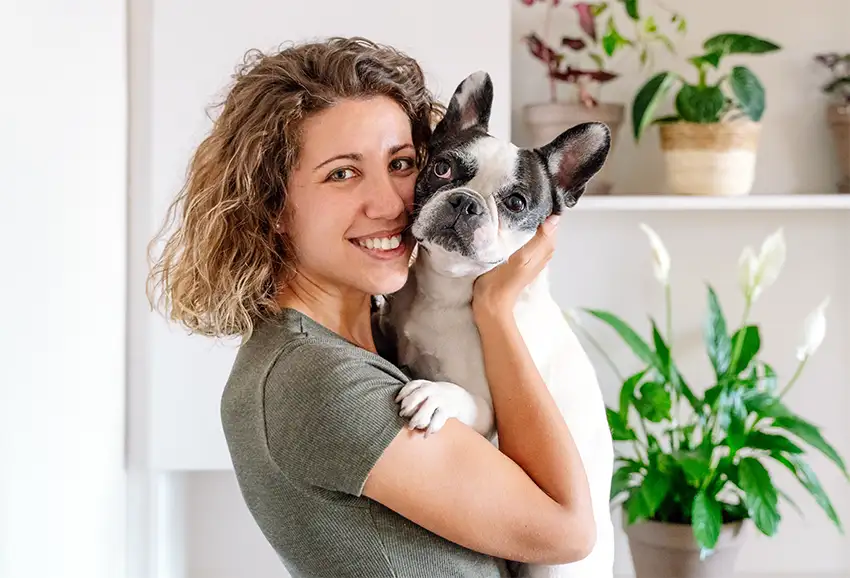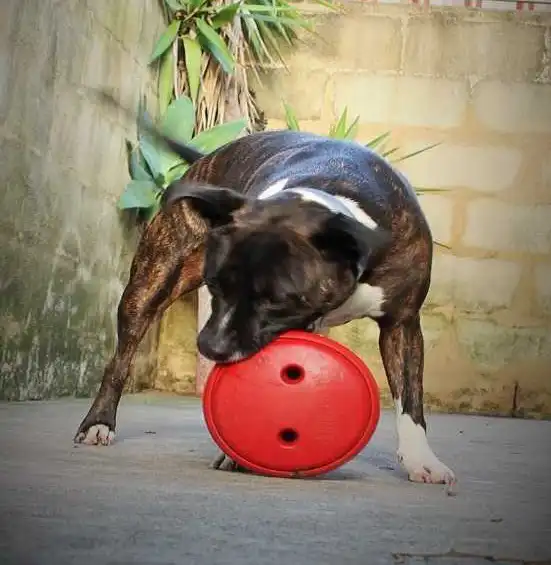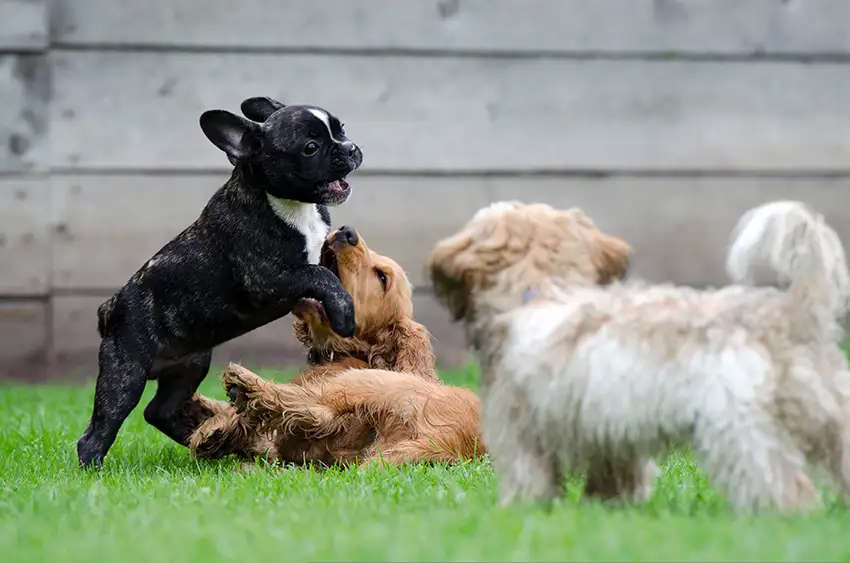The French Bulldog or as the French say, "Le Bouledogue Français", is one of the world's favourite dog breeds. French Bulldogs are compact in size, with iconic, upright "bat ears", infectious personalities, and easy going, but occasionally stubborn, natures. Frenchies are intelligent, adaptable, and adorable dogs that are well-suited for city life and companionship.
French Bulldog Training
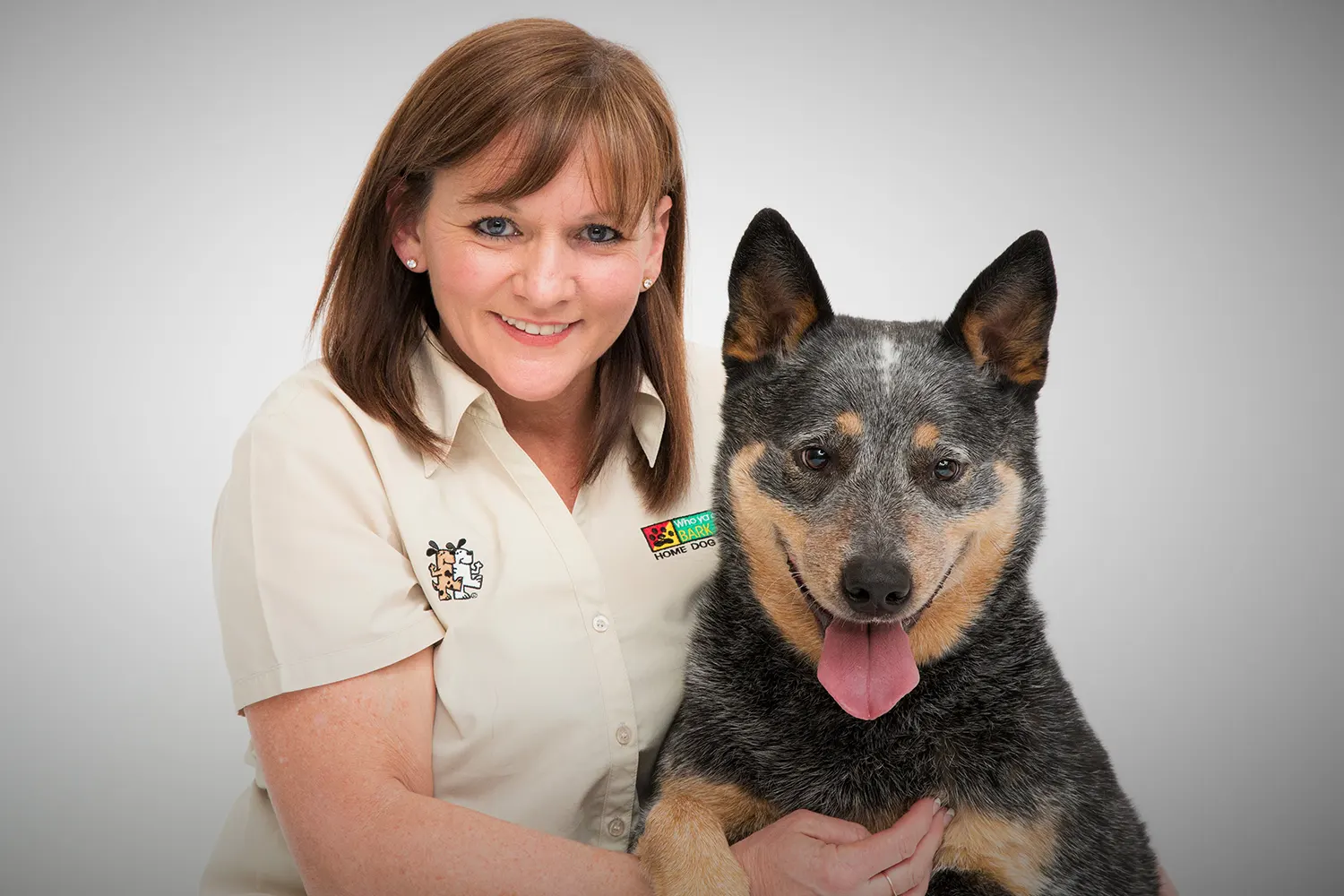
BARK BUSTERS INTERNATIONAL HEAD OF TRAINING - DONNA RYAN
Who can resist Frenchies? Their adorable bat ears, big eyes, and friendly, inquisitive nature towards both people and animals, make them practically irresistible. While not typically problematic, French Bulldogs can be headstrong, and like all dogs, they do require leadership, education, and consistency to avoid behaviour problems. Specialist French Bulldog Training helps ensure their loving personalities don’t develop into demanding or stubborn habits.
Physical Characteristics
These strong, compact dogs come in a variety of colours. Their bat ears and screw tails are among their most distinguishing features. Frenchies, as they are affectionately known, are a brachycephalic breed, literally meaning 'shortened head', and their short snouts can place them at risk of developing breathing problems, especially in hot or humid weather.

History
French Bulldogs evolved from their English cousins around the time of the first Industrial Revolution. Due to industrial disputes, Lacemakers in the city of Nottingham were emigrating to France, to find work, where traditional manufacturing methods had yet to be replaced by machine-based production. They took their English Bulldogs along with them, whose size and ratting ability made them convenient travel mates. Over time, they were crossed with terriers and pugs, creating a new, distinct bulldog breed.
While French Bulldogs soon became status symbols among the French societal elite, they were remarkably democratic in their appeal, equally beloved by everyone from ladies of the night to royalty. Wealthy Americans on visits abroad were also charmed by the adorable breed and began returning home with their own French Bulldogs. It is American breeders who are credited with cementing the iconic bat ear as a defining trait of French Bulldogs, rather than the rose ear inherent to their English counterparts. The breed's popularity grew steadily across Europe and America throughout the end of the 19th century and continues to expand to this day.
Personality and Temperament
French Bulldogs are intelligent, curious, and cute dogs with very stable and predictable temperaments. Their easy-going personalities are adaptable to a variety of living situations. They can coexist peacefully with other breeds but are just as happy to live alone. They can adapt to life in the home or mainly living outdoors.
French Bulldogs are not generally barkers, though their alertness and intelligence make them natural watchdogs. They are extremely loyal, but their natural curiosity and propensity towards stubbornness necessitates early, consistent training to avoid future behaviour problems.

Grooming
French Bulldogs require minimal, but necessary, grooming maintenance. Due to their stubborn nature, it is best to introduce them to grooming early in their life and maintain a consistent schedule. It is recommended their coats be brushed weekly, they have regular nail trimmings, and get routine cleaning and drying of their facial folds and ears, to prevent any infections.
Tips for Potential Dog Owners
Short-nosed (brachycephalic) dogs have inherent health risks resulting from their shorter snouts. It is important to consult with a veterinarian about the best ways to care for a short-nosed dog before adopting one.
French Bulldogs do not require a lot of space or activity, making them excellent dogs for apartment and city dwellers.
If you are thinking of purchasing a French Bulldog, it is important to source from a responsible breeder who is breeding for not only looks, but health and temperament too. Rescues are also a great option for prospective Frenchie owners.
French Bulldogs are great mimickers, and their adorable appearance can lead to unwanted behaviours. By monitoring your own actions, you can make a big change in your French Bulldog's behaviour.
Early basic obedience training is vitally important to ensure your French Bulldog understands and follows your rules.
We are standing by to help you develop a consistent, compassionate approach to good behaviour for your French Bulldog. Learn more about our services and schedule an appointment with one of our trainers today!
Puppy Selection
It is always better to get the right temperament puppy for your family, over picking one based on colour or gender. A pretty face will not matter much if you and your puppy do not get along and does not fit in well with your family's lifestyle.
It is important that you don't remove a puppy from their mother litter before 8 weeks, but 12 weeks would be even better. The time they spend with their mother and siblings is critical to their development. Puppies removed too early tend to be nervous, bark a lot, and bite because appropriate behaviour is learned at their mother's teat. Many long-term behaviour problems can be attributed to a puppy being removed from the litter much too soon.
Socialisation is learned with their littermates, and one that should be ongoing too. Although they are social creatures and generally get along with both people and other dogs, there are always exceptions to the rules. It is important to introduce your dog to new experiences and people, but it must be done carefully and without fear. Never take your dog into fearful situations because traumatic experiences can result in lifelong anxieties.

Introduce your puppy carefully to other dogs that you know could serve as a good role model. Dogs learn a lot from other dogs. Just like you don't want your kids hanging out with bad influences, the same rule should apply to dogs too.
Always choose a reputable breeder and ask for references. French Bulldogs can often cost a pretty penny. That's why we suggest looking at rescue centres, animal welfare shelters or the RSPCA. These dogs are tested for temperament and soundness before being put up for adoption.
If you're out of luck at the recuse centres, then ensure you choose a reputable breeder. Check out the Kennel Club for a list of approved breeders close to you.
Many dogs are abandoned for the wrong reasons and some people are not fully prepared to do what it takes to train and educate a dog. All shelters give their dogs health checks to make sure they are in good shape and up to date on their vaccinations and will make you aware of any behaviour problems too. Bark Busters trainers work with many local shelters to help overcome any behaviour problems before a dog is adopted.
A good breeder will, where possible, try and screen out all the health problems inherent to the breed. They should be happy to answer your questions about temperament and health considerations and should ask you questions about your lifestyle and goals. Reputable breeders are registered, and they abide by certain policies and screening.
Before you decide on a puppy, ask yourself if you would be better off with an adult Frenchie, that would mean lower maintenance and lower energy. Puppies are fun, but they are also a lot of work.
Whether you decide on a puppy or an adult make sure you take your dog to the vet soon after adoption to identify and prevent any problems and to check on its immunisation and desexing needs.
Four Basic Needs
Let's examine those four basic needs and why your dog needs them to keep it healthy, balanced and content.

Food - diet / nutrition
Some dogs can be pretty picky about their food. Consult with your veterinarian about which brand of food you should purchase, or which raw diet is best for your dog. Your dog's diet is important to meet their nutritional needs and to maintain the overall health. For puppies, as they are so small, you don't need a lot of food to fill them up!
We promote a diet that is grain free, low in carbohydrates and without any harmful e-numbers, colours and preservatives. Carbohydrates do add energy that the dog needs to burn off and can make an already hyperactive dog more active.
The right diet, grain free and filled with fruits, vegetables and raw meat will have advantages to how your dog will feel, look and act.
If you want to understand why grains can make a dog more energetic, you only need to think of racehorses and how their trainers give them grain to get highly energetic racehorses. Energy in, equals energy out.
Bark Busters dog trainers are not vets or dietitians, so we urge you to do your own research into the best diet for your dog. A diet that you will be comfortable with.
We do however have vast experience of how highly concentrated grain diets effect behaviour and can cause hyperactivity. This is very prominent in Japan, where most dogs are fed high levels of rice in their diet which can adversely affect concentration and focus.
Safety - through leadership and education
All dogs need strong leadership and to know where they fit into the family unit. If they know they have a leader that will make all the decisions, one who is fair and just, they will be happy and content.
On the other hand, if they have no structure in their life, they have inconsistency, and don’t know how things will be from one day to the next, then they will become stressed and may experience health ailments, skin and stomach issues and behaviour problems. Routine and respect must be established. With equal doses of love and structure your dog will feel safe and secure.
Your dog just wants to please you but many times they don't know how. If you don't quickly establish yourself as the leader, your dog will gladly assume this role and chaos could follow.
Shelter - a place to call their own
Dogs love nothing better than to curl up on the couch or in a place they can call their own, even when there is more than one dog. Most dogs are very sociable, and they will think nothing of all snuggling in together. Provide your dog with its own "den", a place where they can call home, and somewhere they can go to for a bit of peace and quiet. Just make sure their "den" is warm, easy to clean and maintain. Also, this breed does not like to be cold, and their shivering is a sign that some warmth is needed.
Entertainment - toys and games
A very important part of your dog's four basic needs is their need to have something to do. If we want to avoid our pets becoming bored and destructive, then they need a way to fill their day.
Dogs thrive with physical and mental exercise. Dogs are highly intelligent animals, and they need to keep their brains active as much as their bodies. Entertainment is an important part of their well-being and essential to your dog's overall mental health.
One great toy is the Bark Busters GameChanger® which helps to prevent boredom, stress, and separation anxiety. By filling it with small treats, your dog will have plenty of fun trying to get the treats to dispense.
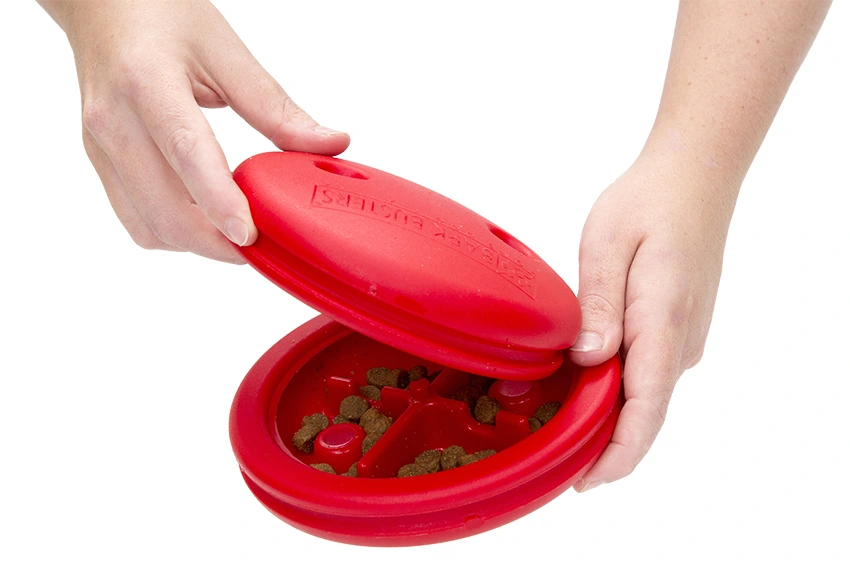
Games to Play

What are the right games, you might ask?
Be mindful of your particular dog’s energy levels. Also, remember your French Bulldog's anatomy, especially it’s face / snout, when choosing a game to play. They can easily become exhausted and worn out, especially in hot weather, so don’t overdo it.
Don't play any games that involves rough and tumble as this only encourages biting. 'Tug of War' is okay and playing ball is good, provided your dog is not the type that gets fixated on the ball and refuses to stop playing when requested.
Hide and seek is a great game too. These are games where you hide things from your dog, like toys or a tennis ball or treats and then encourage them to find them. You can increase the degree of difficulty as your dog gets better at the game. Start out where your dog sees you hide the item, then repeat over and over, 'Seek' which is a good command to use for this exercise. Remember to give a lot of praise when they find it. These types of games are more calming for your Yorkie, than those type of games that encourage your dog to become over-excited or teaches them to bark or bite hands.
Fetch - French Bulldogs are great sports and love to chase balls and play with toys. Your dog will love a rousing game of fetch, challenge yourself to see how far you can throw it. Also teach the command of "out" once you dog has brought the object back to you.
Walking - This classic form of exercise is still great for all breeds, but make sure you don’t overwork your Frenchie, especially in hot weather.
Child’s Play
All dogs need to be controlled around babies or toddlers so as not to nip at them. They are intelligent and do learn quickly, so spend time educating them as to what is good and what is not. If you are patient and understanding of their capabilities, you will be able to enjoy many great times as a family with your dog.
Dog Parks
Taking Your French Bulldog to the Dog Park
Dog parks are one of the most misunderstood dog activities of the modern-day dog world. Some doggie parents love nothing more than to take their dog to a dog park. They have been told they need to socialise their dog and so off they go.
They love the fact that their dog has fun, they get to meet other dog lovers and watch the dog's romp around and play.
That is the upside, but the downside is there are those dog lovers whose dogs don't fit into this world at all. They are those dogs or puppies that were bullied, frightened on their first visit or whose personality does not fit the mould.
These folks agonise over the fact that their dog or puppy does not look forward to its trip there, it hides under the seat of the car, or it has to be carried or enticed into the park.
Many ask us why their dog acts like this and how they can fix it?
Bark Busters do have ways to assist these pet parents, but we do also explain why their dog might not like the dog park because of its personality.
It reminds us of a friend of ours who visited us regularly with her little dog, 'Harry'.
When they would arrive, Harry would walk up to each of us, sniff our legs and walk away.
She questioned us one day on why we never petted Harry when he came up to us.
We explained that this was not what Harry was doing, he was sniffing us, not requesting a pat. If he had been requesting to be petted, after sniffing us, he would have gestured to us to pet him. He did not do that, instead he walked away.
We told her that Harry was not a social dog and preferred not to be touched by anyone other than her and he avoided any interaction with our dogs too. He was a 'one person' dog that did not feel comfortable around others.
It was like a light had been turned on, our friend smiled and told us that this explained a lot to her. She further explained that every time she took Harry to the dog park, that he could not wait to get back to the car when it was time to leave, that he would stand away from the other dogs, never join in the play and snap at other dogs when they came near him.
He was telling her in every way he could that he did not fit into that dog park crowd, just like some humans hate parties!
Bark Busters Lifetime Support Guarantee
Bark Busters dog behaviour therapists and trainers have trained more than 1 Million dogs worldwide and are renowned authorities in addressing dog behaviour with all-natural, dog-friendly methods. The Bark Busters training is the only service of its kind to provide International dog training guaranteed lifetime support. With hundreds of trainers around the world, Bark Busters continues its mission to enhance the human/canine relationship and to reduce the possibility of maltreatment, abandonment and euthanasia. Contact your local Bark Busters dog trainer to see how they can help.
This article is the copyright of Bark Busters® and is intended for information purposes only. Dog owners should fully research any problems that they may have with their dogs.

